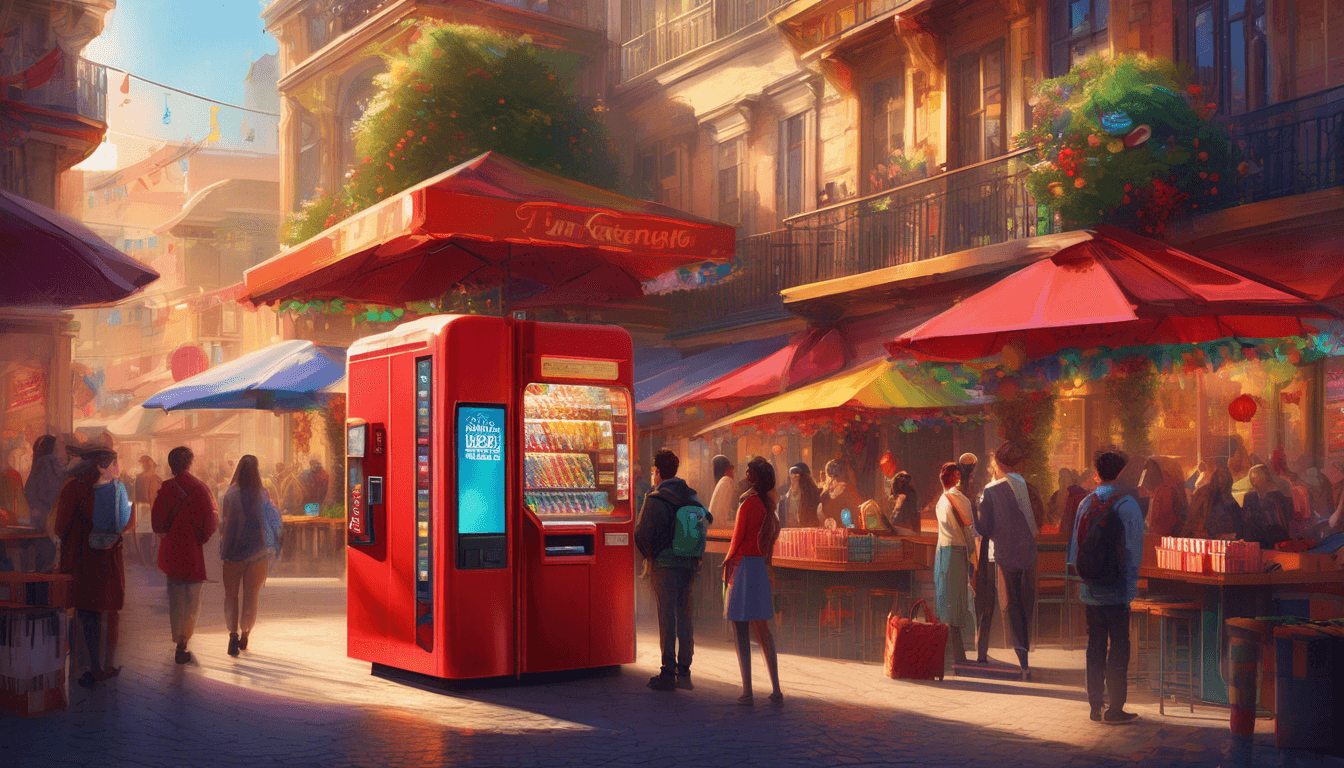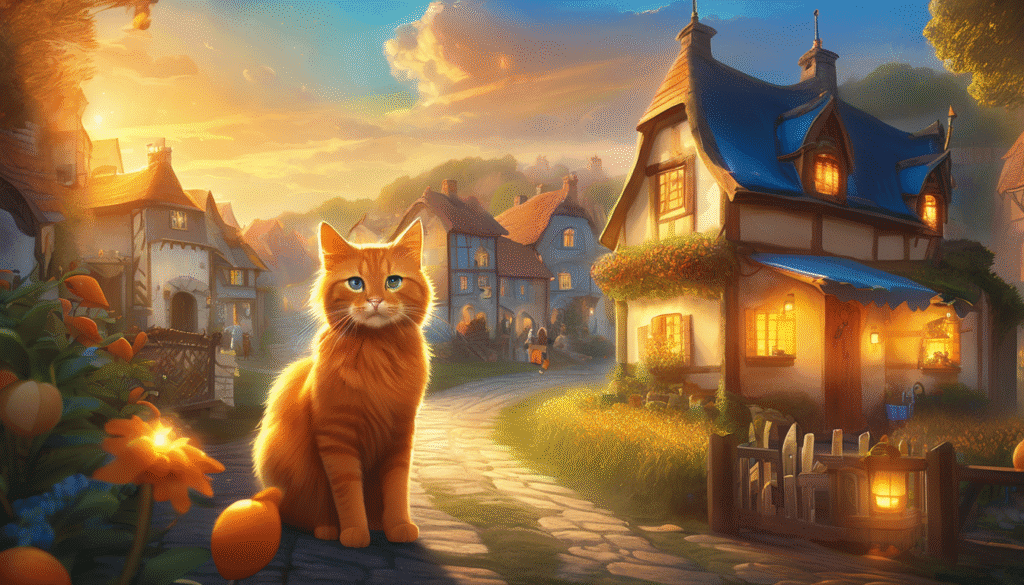Once upon a time, in the bustling little town of Willowby, there was a bright red vending machine that stood right in the center of Maple Square. It was an ordinary vending machine on the outside, with shiny buttons and a glowing screen. Children and grown-ups alike would visit it for a treat—maybe a fizzy soda, a crunchy bag of chips, or sometimes a sweet chocolate bar to brighten their day. But what nobody knew—at least, not yet—was that this vending machine was about to become the most extraordinary thing Willowby had ever seen.
It all began one breezy evening, when the sun was slipping behind the rooftops, painting the sky with swirls of gold and purple. A little girl named Maisie wandered into Maple Square, clutching a few coins in her mittened hand. She was feeling rather glum because she’d lost her favorite marble at recess. Hoping for a pick-me-up, Maisie skipped over to the vending machine and pressed the button for chocolate.
But instead of a chocolate bar, a little slip of paper fluttered down to the tray. Maisie picked it up, puzzled. The paper read: “Sometimes lost things turn up when you’re not looking for them!” There was no chocolate, but the message made Maisie smile. She tucked the note in her pocket, and as she walked away, she wondered if her marble would find its way back to her after all.
The next morning, Mr. Hobbes, the baker, stopped by. He was tired from waking up before dawn to bake cinnamon rolls, and he thought a fizzy soda would help. He pressed the soda button, but once again, a piece of paper slid out. It said, “Even the best bakers need to rest. Take a walk and let your worries melt away.” Mr. Hobbes blinked in surprise, but the advice felt warm and gentle, like a hug. So he walked around Maple Square, listening to the birds, and sure enough, he felt much better.
Soon, word spread through Willowby that the vending machine had stopped giving snacks and started giving advice. Some people were frustrated—they missed their treats! But others were curious. What would the vending machine tell them? One after another, people lined up to try their luck.
Lila, who always worried about being late, pressed the button and got: “Time is like a river—sometimes you have to float, sometimes you have to paddle.” She giggled and decided to walk to school instead of running and tripping over her own feet.
Old Mrs. Green, who missed her cat, pressed a button and found: “The love you gave is still purring in your heart.” Tears welled up in her eyes, but soon she was smiling, remembering all the happy times with her furry friend.
The vending machine’s advice wasn’t just wise; it was sometimes silly, sometimes sweet, and always just what people needed. A note might say, “Try dancing in your socks today!” or “Smile at the postman, he has a secret.” Pretty soon, Maple Square was filled with giggles and secret smiles.
One windy afternoon, three friends, Toby, Nora, and Jasper, decided to investigate. They crouched behind the vending machine, peeking around the corners to see if anyone was hiding inside, scribbling notes. But the machine just hummed quietly, its lights blinking like sleepy eyes.
“Maybe there’s a tiny advice fairy living inside!” whispered Nora.
“Or a helpful robot with a typewriter!” guessed Jasper.
Toby thought for a moment. “Or maybe the machine just listens really, really well and knows what people need to hear.”
The children pressed a button together, and out popped a note: “Some mysteries are meant to be enjoyed, not solved!” The friends burst into laughter and spent the afternoon making up stories about the vending machine’s secret life.
As the days went on, the townspeople found themselves looking forward to their visits. When little Oscar was nervous about his first swimming lesson, the vending machine told him, “Big waves are just water saying hello!” Oscar laughed, and suddenly swimming didn’t seem so scary.
When Mrs. Patel accidentally shrunk all her husband’s socks in the dryer, she pressed a button and received: “Tiny socks can be doll hats, or maybe just a reason to giggle.” She started making sock hats for her granddaughter’s teddy bears, and the whole family joined in the fun.
Even the mayor came by, worried about a big speech he had to give. The vending machine’s note read: “Talk from your heart and the words will find their way.” The mayor smiled, and his speech was the best the town had ever heard.
No one missed their snacks for long, because the vending machine’s advice filled up hearts instead of bellies. The town grew a little softer, a little kinder. People talked to each other more, sharing the notes they’d collected. Some even started leaving their own advice tucked around town—on benches, in mailboxes, under flowerpots.
One evening, Maisie found something wonderful. She was helping her mom tidy up the attic when she noticed a shiny glint beneath an old scarf. She reached down and, to her delight, found her missing marble! She remembered the note from the vending machine and grinned—a lost thing had turned up when she wasn’t looking for it.
Maisie wanted to thank the vending machine, so she drew a picture of her marble with a big smile, and taped it to the glass. Other townsfolk followed her lead, decorating the machine with drawings, ribbons, and even tiny hats made from Mrs. Patel’s sock project.
Then, something magical happened. One starry night, as the town slept, the vending machine glowed brighter than ever before. The lights twinkled in rainbow colors, and the machine hummed a happy tune. In the morning, the townspeople found a new note, this one big enough for everyone to see. It said: “Thank you, Willowby, for listening, laughing, and sharing kindness. You’ve made me feel at home.”
The people of Willowby cheered. They decided to throw a party for the vending machine. There were balloons, cupcakes, and music. The children danced in their socks, the mayor read his speech again, and Mrs. Green taught everyone how to make paper cats. The vending machine, dressed in streamers and hats, glowed with happiness.
After that, the vending machine continued to dispense advice instead of snacks. People came from nearby towns just to see it, hoping for a bit of wisdom. The machine never ran out of advice, and every note was different, as if it knew exactly what each person needed most.
One rainy day, little Jack, feeling lonely, pressed the button and found a note: “Rain makes puddles, and puddles make splashes. Find someone to jump with you!”
Jack found his sister, and together they jumped in puddles until they were both soaked and laughing.
When the town librarian, Miss Wren, felt overwhelmed by all the books she had to organize, she received: “Stories are like friends—sort them gently, one at a time.” She took a deep breath, and soon the library was tidy as a nest.
The vending machine became a legend. Children wrote stories about it, and grown-ups made scrapbooks of their favorite notes. One elderly man, Mr. Finch, made a little wooden bench beside the machine, so folks could sit and think about the advice they’d received, or simply watch the world go by.
Sometimes, people wondered how the vending machine had learned to be so wise. Some said it listened to conversations, others whispered it was magic. But everyone agreed that Willowby felt a little brighter, a little friendlier, and a whole lot more whimsical.
Seasons changed. The maple trees blazed with color in the fall, then lost their leaves to winter’s frosty touch. The vending machine wore a scarf in the snow and an umbrella in the rain, thanks to the caring townsfolk. Through every season, it offered advice and comfort, never asking for anything in return.
Maisie grew taller, her hair catching the sunlight as she walked to school. Every now and then she’d stop by the vending machine, pressing a button for a new bit of wisdom. Each note felt like a secret treasure, a reminder that she was never alone.
One spring morning, as birds sang and flowers popped up everywhere, the vending machine released a very special note. It read: “Advice is nice, but kindness is magic. Pass it on.” The townspeople took the message to heart. They helped each other with groceries, raked leaves together, and took turns walking Mrs. Green’s new kitten.
Willowby became known far and wide as the town where magic lived in a vending machine and kindness grew like wildflowers. People from all over came to see the machine, and they left with smiles, laughter, and hearts a little lighter than before.
One summer night, under a sky full of twinkling stars, the vending machine glowed softly, as if it were dreaming. Maisie and her friends sat on the bench, eating ice cream cones and trading stories. They wondered if the vending machine was happy.
“I think it is,” whispered Maisie. “After all, it helps people. That’s the best kind of happy.”
The friends listened to the soft hum of the machine and the gentle night sounds of Willowby. They knew that as long as there were questions or worries or dreams, the vending machine would be there, ready with just the right advice.
And so, the bright red vending machine stood in Maple Square for many years, its lights shining through rain and snow and sunshine, a beacon of whimsy and wisdom for all who needed it.
If you ever visit Willowby, look for the vending machine. Press a button, and you might just find the advice you never knew you needed, wrapped up in a little slip of paper, glowing with magic and kindness.
And who knows? Maybe, just maybe, you’ll leave a note of your own, for the next dreamer who comes along.
So, if you ever lose a marble, shrink a sock, or worry about a big speech, remember the wise old vending machine of Willowby. Sometimes advice is even sweeter than chocolate, and kindness always tastes best.
Good night, little one. May you dream of rainbow lights and slips of wisdom, of friends who dance in their socks, and of a vending machine that knows just what your heart needs to hear. The end.





Leave a Reply